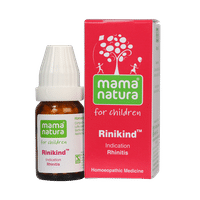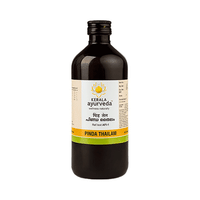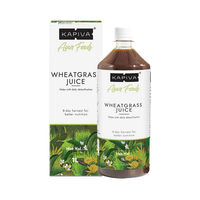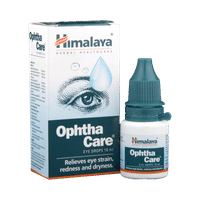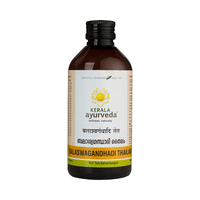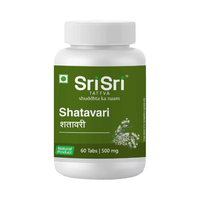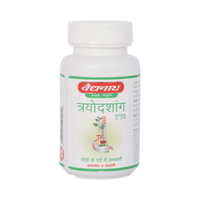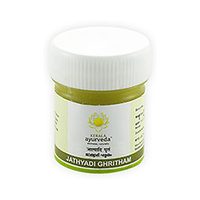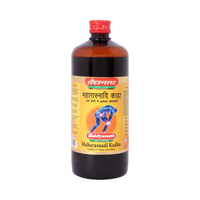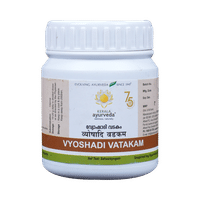Rs. 105
Rs. 110
5% off
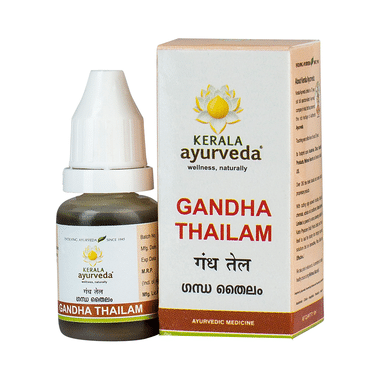
Product Details
Kerala Ayurveda Gandha Thailam capsule is an ayurvedic medicine prepared as the Ashtangahrudayam classical Ayurveda text. It has a number of herbal ingredients that are helpful in joint care and enhancing bone strength. It can help in providing relief from joint pain and associated symptoms. It is one of the medicines that can be helpful in healing all problems related to the joints. It is an ayurvedic medicine for bone strength. It helps to strengthen joints and bones. This ensures the joints are in good condition. It helps to remove toxins and strengthen tissues. This prevents pain and helps to alleviate vata imbalance.
Key Ingredients:
Thila (Sesamum indicum), Jalam (Water) Q.S, Ksheera (Milk), Yashtimadhu (Glycyrrhiza glabra), Manjishta (Rubia cordifolia), Kola (Cyperus malaccensis), Rakthachandana (Pterocarpus santalinus), Sveta sariva (Hemidesmus indicus), Sarjarasa (Vateria indica), Ajmoda (Trachyspermum ammi), Kushta (Saussurea lappa), Devadaru (Cedrus deodara), Yashtimadhu (Glycyrrhiza glabra), Ksheera (Milk), Ela (Elettaria cardamomum), Prishniparni (Pseudarthria viscida), Patra (Cinnamomum tamala), Jivanti (Holostemma ada kodien), Tagara (Valeriana wallichi), Lodhra (Symplocos racemosa), Durva (Cassia tora), Guduchi (Tinospora cordifolia), Ksirakakoli (Lilium polyphyllum), Kakoli (Lilium polyphyllum), Meda (Polygonatum cirrhifolium), Mahameda (Polygonatum cirrhifolium), Ridhi (Habenaria intermedia), Vridhi (Habenaria intermedia), Sveta sariva (Hemidesmus indicus), Sringataka (Pistacia integerrima), Madhuyashti (Glycyrrhiza glabra), Manjishta (Rubia cordifolia), Kushta (Saussurea lappa), Sarjarasa (Shorea robusta), Jatamansi (Nardostachys jatamansi), Devadaru (Cedrus deodara), Rakthachandana (Pterocarpus santalinus), Ajmoda (Trachyspermum ammi), Hrivera (Coleus vettiveroides).
Indications:
Weak joints
Net Quantity:
10 ml
Product Form:
Oil
Key Benefits:
Dosage:
Take 1 capsule twice daily or as directed by physician.
Safety Information
Frequently Asked Questions:
What is ayurvedic medicine?
Ayurvedic medicine is a traditional system of medicine that originated in India over 3,000 years ago. It emphasises a holistic approach to healthcare, focusing on the balance of mind, body, and spirit to promote overall well-being.
How does ayurvedic medicine work?
Ayurvedic medicine is based on the principle of balancing the three doshas (vata, pitta, and kapha) to maintain health. Treatments may include herbal remedies, dietary adjustments, yoga, meditation, and lifestyle changes to restore this balance.
How long does it take to see results with ayurvedic medicine?
The time it takes to see results varies depending on the individual, their condition, and their concern. Some may experience improvement quickly, while others may require more time and consistent practice.
Key Ingredients:
Thila (Sesamum indicum), Jalam (Water) Q.S, Ksheera (Milk), Yashtimadhu (Glycyrrhiza glabra), Manjishta (Rubia cordifolia), Kola (Cyperus malaccensis), Rakthachandana (Pterocarpus santalinus), Sveta sariva (Hemidesmus indicus), Sarjarasa (Vateria indica), Ajmoda (Trachyspermum ammi), Kushta (Saussurea lappa), Devadaru (Cedrus deodara), Yashtimadhu (Glycyrrhiza glabra), Ksheera (Milk), Ela (Elettaria cardamomum), Prishniparni (Pseudarthria viscida), Patra (Cinnamomum tamala), Jivanti (Holostemma ada kodien), Tagara (Valeriana wallichi), Lodhra (Symplocos racemosa), Durva (Cassia tora), Guduchi (Tinospora cordifolia), Ksirakakoli (Lilium polyphyllum), Kakoli (Lilium polyphyllum), Meda (Polygonatum cirrhifolium), Mahameda (Polygonatum cirrhifolium), Ridhi (Habenaria intermedia), Vridhi (Habenaria intermedia), Sveta sariva (Hemidesmus indicus), Sringataka (Pistacia integerrima), Madhuyashti (Glycyrrhiza glabra), Manjishta (Rubia cordifolia), Kushta (Saussurea lappa), Sarjarasa (Shorea robusta), Jatamansi (Nardostachys jatamansi), Devadaru (Cedrus deodara), Rakthachandana (Pterocarpus santalinus), Ajmoda (Trachyspermum ammi), Hrivera (Coleus vettiveroides).
Indications:
Weak joints
Net Quantity:
10 ml
Product Form:
Oil
Key Benefits:
- This oil is useful not just for joint care but even for healing fractures
- The formulation can reduce the imbalance of vata dosha and thus deal with all joint-related problems
- It is useful in the management of injuries to the ligaments and can promote faster healing
- It is very useful in improving the strength of bones
- This is helpful in managing concerns associated with osteoporosis and arthritis
- Manjistha, or rubia cordifolia, is a common grape and an excellent blood purifier that eliminates toxins
- Kushta, or saussurea lappa (costus root), corrects vata imbalance, making it effective for arthritis and toxin removal
- Devadaru, cedrus deodara (Himalayan cedar), rectifies vata dosha imbalance and provides relief from joint inflammation, especially in rheumatoid arthritis
- Shweta sariva, or hemidesmus indicus (Indian sarsaparilla), is a tridosha-hara remedy that balances all doshas, removes toxins, and aids in treating osteoporosis
- Yashtimadhu, or glycyrrhiza glabra (licorice), restores Vata balance, promotes healing in bone fractures, and alleviates inflammation
Dosage:
Take 1 capsule twice daily or as directed by physician.
Safety Information
- Read the label carefully before use
- Store in a cool and dry place
- Keep out of reach of children
- Don't exceed the recommended dosage
Frequently Asked Questions:
What is ayurvedic medicine?
Ayurvedic medicine is a traditional system of medicine that originated in India over 3,000 years ago. It emphasises a holistic approach to healthcare, focusing on the balance of mind, body, and spirit to promote overall well-being.
How does ayurvedic medicine work?
Ayurvedic medicine is based on the principle of balancing the three doshas (vata, pitta, and kapha) to maintain health. Treatments may include herbal remedies, dietary adjustments, yoga, meditation, and lifestyle changes to restore this balance.
How long does it take to see results with ayurvedic medicine?
The time it takes to see results varies depending on the individual, their condition, and their concern. Some may experience improvement quickly, while others may require more time and consistent practice.













